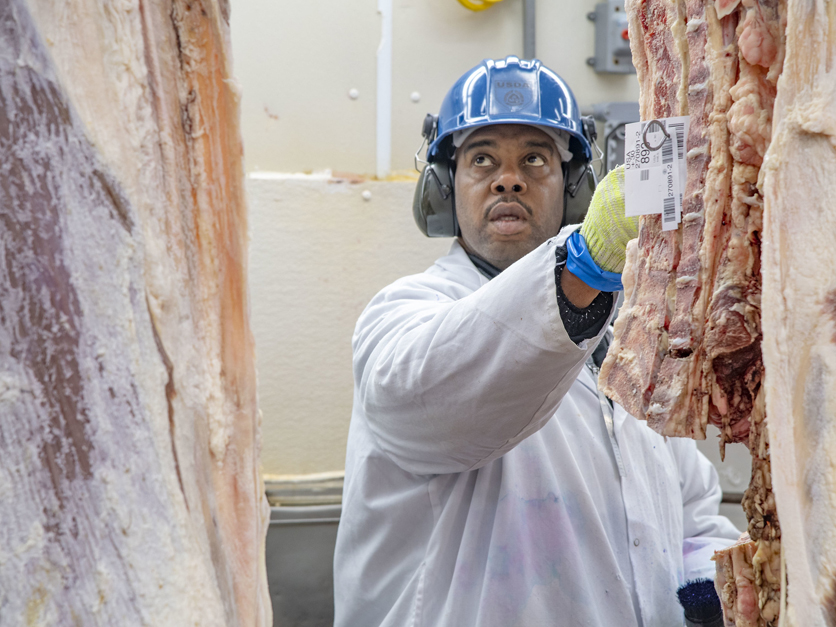USDA meat inspectors told to find or make their own masks
USDA meat inspectors told to find or make their own masks
04/10/20 2:26 PM By Bill Tomson

Meat packers need federal inspectors to produce the pork chops, T-bone steaks and ground beef that consumers are counting on to be in grocery stores, but the USDA inspectors on the front line are being told they are on their own when it comes to securing masks to protect against the spread of COVID-19.
USDA, despite calls from meat inspectors at slaughtering and processing plants across the country, is still not distributing face masks or other protective gear, a government source told Agri-Pulse Friday.
The government just doesn’t have enough supplies, USDA told its employees, including the roughly 6,500 meat inspectors at slaughtering and processing plants across the country, in an internal memo dated Apr. 4 and viewed by Agri-Pulse.
“While the department is unable to provide masks to all mission essential employees at this time, we will notify our workforce as soon as possible as additional … supplies become available,” states the memo distributed by USDA’s Office of the Deputy Secretary.
As to the message directly to meat inspectors, USDA’s Food Safety and Inspection Service is telling them to buy masks, get them from packers or make their own.
“FSIS realizes that due to increasing demand, the availability of commercial face coverings … may be limited,” the agency said in a notice to employees Thursday that offers to reimburse the cost of buying or making them.
A USDA spokeswoman did not respond to requests for comment.
But government inspectors at meat packers are getting sick and FSIS employees are demanding to be protected, says union leader Paula Schelling, acting chairman of the National Joint Council.
“They’re putting that out there in an attempt to make people feel warm and fuzzy when there are no face masks out there,” Schelling told Agri-Pulse. “There are no face masks out there to buy. To me it’s a band-aid on an open wound … That’s the bottom line.”
The requests from inspectors, voiced at weekly virtual town hall meetings, are becoming more dire as COVID-19 outbreaks are becoming more common in meat packing plants.
On March 26, responding to “a number of questions and concerns from employees about the use of face masks,” at one of those town hall meetings, FSIS said it would not provide them based on CDC recommendations, according to another FSIS memo to employees obtained by Agri-Pulse.
But CDC recommendations have changed since then. Whereas FSIS was previously operating under guidance that face masks were only needed by health care providers and people with respiratory symptoms, CDC is now recommending the masks for people with no symptoms.
Other requests coming in to FSIS from meat packing plants include pleas for the government to scale back the number of inspectors at plants, including postponing training, in order to minimize the number of people coming in and out of plants, a source involved in the town hall meetings told Agri-Pulse.
And the industry is working to protect workers in packing plants, says North American Meat Institute President and CEO Julie Anna Potts.
“Many member companies are providing masks and shields to their employees along with other forms of personal protective equipment,” she told Agri-Pulse. “The Meat Institute is also working with the federal government and other food industry groups to ensure member companies can obtain these products.”
Smithfield Foods is the latest to react to an outbreak at its Sioux Falls, S.D., plant, reducing operations Saturday and suspending them Sunday and Monday after employees tested positive for the virus. The Trump administration is leaning on Smithfield to continue operations to help keep meat supplies flowing to consumers, Sioux Falls Mayor Paul TenHaken said Thursday after a 30-minute call with Smithfield CEO Ken Sullivan.
“In fact, the CEO had to leave the call with me because (USDA) Secretary Sonny Perdue was on the line and (Sullivan) had to drop me to take that call to continue to talk about the importance of them staying open,” TenHaken said at a press conference.
A USDA spokeswoman did not respond to requests for comment on Perdue’s conversation with Sullivan.
Sullivan, in a statement, said the company would not stop producing.
“Not operating is not an option,” he said. “People need to eat … Food is essential for survival and civil society. So, we must produce food for our communities and our countries. It’s our obligation and duty to our fellow citizens.”
For more news, go to www.Agri-Pulse.com